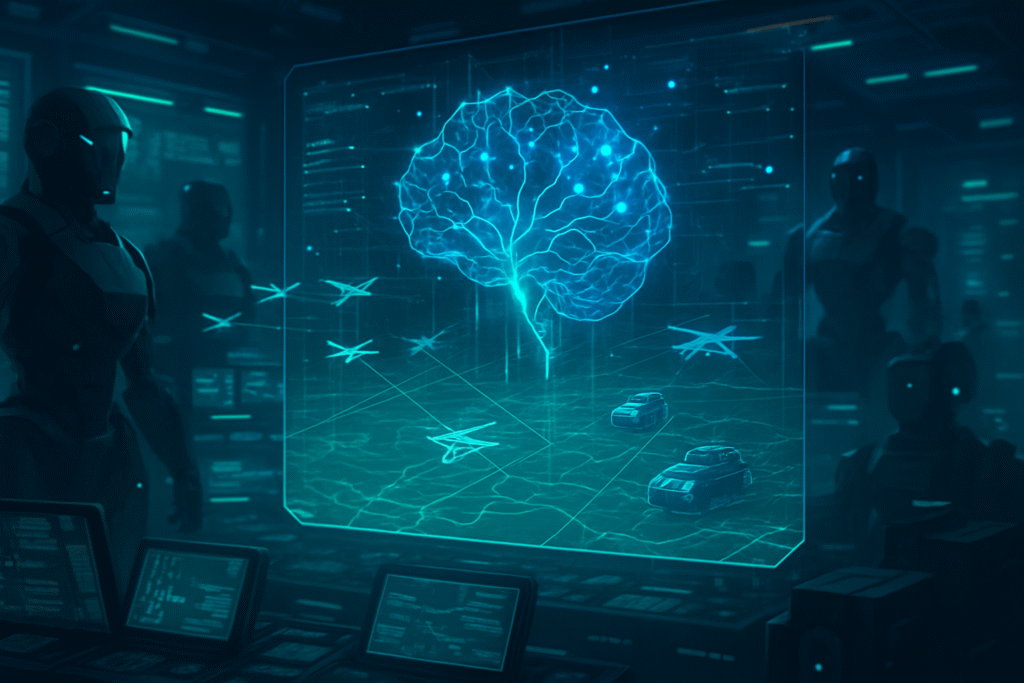
As of October 2025, artificial intelligence (AI) has moved beyond theoretical discussions to become an indispensable and transformative force within the global defense sector. Nations worldwide are locked in an intense "AI arms race," aggressively investing in and integrating advanced AI capabilities to secure technological superiority and fundamentally redefine modern warfare. This rapid adoption signifies a seismic shift in strategic doctrines, operational capabilities, and the very nature of military engagement.
This pervasive integration of AI is not merely enhancing existing military functions; it is a core enabler of next-generation defense systems. From autonomous weapon platforms and sophisticated cyber defense mechanisms to predictive logistics and real-time intelligence analysis, AI is rapidly becoming the bedrock upon which future national security strategies are built. The immediate implications are profound, promising unprecedented precision and efficiency, yet simultaneously raising complex ethical, legal, and societal questions that demand urgent global attention.
AI's Technical Revolution in Military Applications
The current wave of AI advancements in defense is characterized by a suite of sophisticated technical capabilities that are dramatically altering military operations. Autonomous Weapon Systems (AWS) stand at the forefront, with several nations by 2025 having developed systems capable of making lethal decisions without direct human intervention. This represents a significant leap from previous remotely operated drones, which required continuous human control, to truly autonomous entities that can identify targets and engage them based on pre-programmed parameters. The global automated weapon system market, valued at approximately $15 billion this year, underscores the scale of this technological shift. For instance, South Korea's collaboration with Anduril Industries exemplifies the push towards co-developing advanced autonomous aircraft.
Beyond individual autonomous units, swarm technologies are seeing increased integration. These systems allow for the coordinated operation of multiple autonomous aerial, ground, or maritime platforms, vastly enhancing mission effectiveness, adaptability, and resilience. The U.S. Department of Defense's OFFSET program has already demonstrated the deployment of swarms comprising up to 250 autonomous robots in complex urban environments, a stark contrast to previous single-unit deployments. This differs from older approaches by enabling distributed, collaborative intelligence, where the collective can achieve tasks far beyond the capabilities of any single machine.
Furthermore, AI is revolutionizing Command and Control (C2) systems, moving towards decentralized models. DroneShield's (ASX: DRO) new AI-driven C2 Enterprise (C2E) software, launched in October 2025, exemplifies this by connecting multiple counter-drone systems for large-scale security, enabling real-time oversight and rapid decision-making across geographically dispersed areas. This provides a significant advantage over traditional, centralized C2 structures that can be vulnerable to single points of failure. Initial reactions from the AI research community highlight both the immense potential for efficiency and the deep ethical concerns surrounding the delegation of critical decision-making to machines, particularly in lethal contexts. Experts are grappling with the implications of AI's "hallucinations" or erroneous outputs in such high-stakes environments.
Competitive Dynamics and Market Disruption in the AI Defense Landscape
The rapid integration of AI into the defense sector is creating a new competitive landscape, significantly benefiting a select group of AI companies, established tech giants, and specialized startups. Companies like Anduril Industries, known for its focus on autonomous systems and border security, stand to gain immensely from increased defense spending on AI. Their partnerships, such as the one with South Korea for autonomous aircraft co-development, demonstrate a clear strategic advantage in a burgeoning market. Similarly, DroneShield (ASX: DRO), with its AI-driven counter-drone C2 software, is well-positioned to capitalize on the growing need for sophisticated defense against drone threats.
Major defense contractors, including General Dynamics Land Systems (GDLS), are also deeply integrating AI. GDLS's Vehicle Intelligence Tools & Analytics & Analytics for Logistics & Sustainment (VITALS) program, implemented in the Marine Corps' Advanced Reconnaissance Vehicle (ARV), showcases how traditional defense players are leveraging AI for predictive maintenance and logistics optimization. This indicates a broader trend where legacy defense companies are either acquiring AI capabilities or aggressively investing in in-house AI development to maintain their competitive edge. The competitive implications for major AI labs are substantial; those with expertise in areas like reinforcement learning, computer vision, and natural language processing are finding lucrative opportunities in defense applications, often leading to partnerships or significant government contracts.
This development poses a potential disruption to existing products and services that rely on older, non-AI driven systems. For instance, traditional C2 systems face obsolescence as AI-powered decentralized alternatives offer superior speed and resilience. Startups specializing in niche AI applications, such as AI-enabled cybersecurity or advanced intelligence analysis, are finding fertile ground for innovation and rapid growth, potentially challenging the dominance of larger, slower-moving incumbents. The market positioning is increasingly defined by a company's ability to develop, integrate, and secure advanced AI solutions, creating strategic advantages for those at the forefront of this technological wave.
The Wider Significance: Ethics, Trends, and Societal Impact
The ascendancy of AI in defense extends far beyond technological specifications, embedding itself within the broader AI landscape and raising profound societal implications. This development aligns with the overarching trend of AI permeating every sector, but its application in warfare introduces a unique set of ethical considerations. The most pressing concern revolves around Autonomous Weapon Systems (AWS) and the question of human control over lethal force. As of October 2025, there is no single global regulation for AI in weapons, with discussions ongoing at the UN General Assembly. This regulatory vacuum amplifies concerns about reduced human accountability for war crimes, the potential for rapid, AI-driven escalation leading to "flash wars," and the erosion of moral agency in conflict.
The impact on cybersecurity is particularly acute. While adversaries are leveraging AI for more sophisticated and faster attacks—such as AI-enabled phishing, automated vulnerability scanning, and adaptive malware—defenders are deploying AI as their most powerful countermeasure. AI is crucial for real-time anomaly detection, automated incident response, and augmenting Security Operations Center (SOC) teams. The UK's NCSC (National Cyber Security Centre) has made significant strides in autonomous cyber defense, reflecting a global trend where AI is both the weapon and the shield in the digital battlefield. This creates an ever-accelerating cyber arms race, where the speed and sophistication of AI systems dictate defensive and offensive capabilities.
Comparisons to previous AI milestones reveal a shift from theoretical potential to practical, high-stakes deployment. While earlier AI breakthroughs focused on areas like game playing or data processing, the current defense applications represent a direct application of AI to life-or-death scenarios on a national and international scale. This raises public concerns about algorithmic bias, the potential for AI systems to "hallucinate" or produce erroneous outputs in critical military contexts, and the risk of unintended consequences. The ethical debate surrounding AI in defense is not merely academic; it is a critical discussion shaping international policy and the future of human conflict.
The Horizon: Anticipated Developments and Lingering Challenges
Looking ahead, the trajectory of AI in defense points towards even more sophisticated and integrated systems in both the near and long term. In the near term, we can expect continued advancements in human-machine teaming, where AI-powered systems work seamlessly alongside human operators, enhancing situational awareness and decision-making while attempting to preserve human oversight. Further development in swarm intelligence, enabling larger and more complex coordinated autonomous operations, is also anticipated. AI's role in intelligence analysis will deepen, leading to predictive intelligence that can anticipate geopolitical shifts and logistical demands with greater accuracy.
On the long-term horizon, potential applications include fully autonomous supply chains, AI-driven strategic planning tools that simulate conflict outcomes, and advanced robotic platforms capable of operating in extreme environments for extended durations. The UK's Strategic Defence Review 2025's aim to deliver a "digital targeting web" by 2027, leveraging AI for real-time data analysis and accelerated decision-making, exemplifies the direction of future developments. Experts predict a continued push towards "cognitive warfare," where AI systems engage in information manipulation and psychological operations.
However, significant challenges need to be addressed. Ethical governance and the establishment of international norms for the use of AI in warfare remain paramount. The "hallucination" problem in advanced AI models, where systems generate plausible but incorrect information, poses a catastrophic risk if not mitigated in defense applications. Cybersecurity vulnerabilities will also continue to be a major concern, as adversaries will relentlessly seek to exploit AI systems. Furthermore, the sheer complexity of integrating diverse AI technologies across vast military infrastructures presents an ongoing engineering and logistical challenge. Experts predict that the next phase will involve a delicate balance between pushing technological boundaries and establishing robust ethical frameworks to ensure responsible deployment.
A New Epoch in Warfare: The Enduring Impact of AI
The current trajectory of Artificial Intelligence in the defense sector marks a pivotal moment in military history, akin to the advent of gunpowder or nuclear weapons. The key takeaway is clear: AI is no longer an ancillary tool but a fundamental component reshaping strategic doctrines, operational capabilities, and the very definition of modern warfare. Its immediate significance lies in enhancing precision, speed, and efficiency across all domains, from predictive maintenance and logistics to advanced cyber defense and autonomous weapon systems.
This development's significance in AI history is profound, representing the transition of AI from a primarily commercial and research-oriented field to a critical national security imperative. The ongoing "AI arms race" underscores that technological superiority in the 21st century will largely be dictated by a nation's ability to develop, integrate, and responsibly govern advanced AI systems. The long-term impact will likely include a complete overhaul of military training, recruitment, and organizational structures, adapting to a future defined by human-machine teaming and data-centric operations.
In the coming weeks and months, the world will be watching for progress in international discussions on AI ethics in warfare, particularly concerning autonomous weapon systems. Further announcements from defense contractors and AI companies regarding new partnerships and technological breakthroughs are also anticipated. The delicate balance between innovation and responsible deployment will be the defining challenge as humanity navigates this new epoch in warfare, ensuring that the immense power of AI serves to protect, rather than destabilize, global security.
This content is intended for informational purposes only and represents analysis of current AI developments.
TokenRing AI delivers enterprise-grade solutions for multi-agent AI workflow orchestration, AI-powered development tools, and seamless remote collaboration platforms.
For more information, visit https://www.tokenring.ai/.







